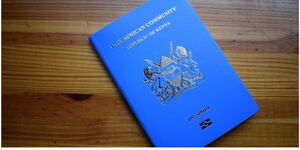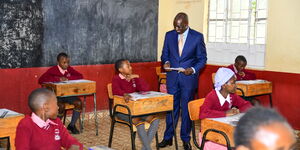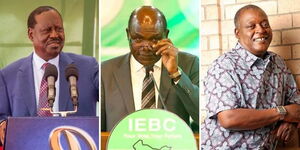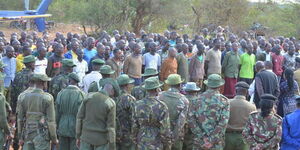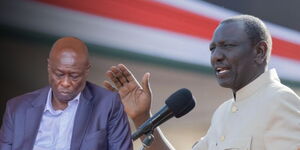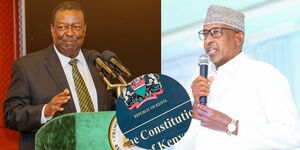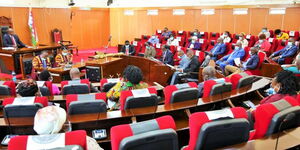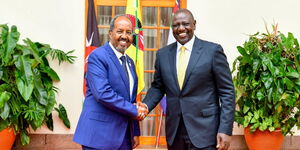The Supreme Court of Kenya on Monday, September 5, upheld the declaration of William Ruto as the president-elect by the Independent Electoral and Boundaries Commission (IEBC).
Herein is the full summary of their judgement as read by Chief Justice Martha Koome. She, however, noted that Supreme Court judges will deliver full judgment after 21 days.
Supreme Court Verdict
Following the Presidential Election held on August 9, 2022, the Chairperson of IEBC Mr. Wafula Chebukati declared William Ruto as the President-elect on 15th August 2022.
Consequently, a total of nine (9) Presidential Election Petitions were filed in the Supreme Court, two of which were struck out for failure to meet the constitutional threshold as set out under Article 140 (1) of the Constitution.
The remaining seven Petitions were consolidated with Presidential Election Petition No. E005 of 2022- Raila Odinga & Another vs. IEBC & 8 Others designated as the lead file.
Having considered and deliberated upon the consolidated Presidential Election Petition, the attendant responses, submissions by counsel and briefs filed by friends of the Court, including the Law Society of Kenya and the Kenyan Section of the ICJ, the Court delineated nine (9) issues for determination.
Whether the technology deployed by the IEBC for the conduct of the 2022 general elections met the standards of integrity, verifiability, security, and transparency to guarantee accurate and verifiable results.
Upon considering the pleadings, submissions, and the ICT scrutiny and inspection, tallying and recount report by the Registrar which fully examined the IEBC’s Result Transmission System (RTS), the Court was not persuaded that the technology deployed by IEBC failed the standard of Article 86(a) of the Constitution on integrity, verifiability, security and transparency.
Whether there was interference with the uploading and transmission of Forms 34A from the polling station to the IEBC Public Portal
No credible evidence was presented to the Court to establish there was any interference with the uploading and transmission of Forms 34A from the polling station to the IEBC public portal.
Whether there was a difference between Forms 34A uploaded on the IEBC Public Portal and the Forms 34A received at the National Tallying Centre, and Forms 34A issued to the Agents at the Polling Stations.
The Court found that there was no difference between the Forms 34A uploaded on the IEBC public portal with those received at the National Tallying Centre, and those issued to the candidates’ agents at the Polling Stations.
Whether the postponement of Gubernatorial Elections in Kakamega and Mombasa Counties, Parliamentary elections in Kitui Rural, Kacheliba Rongai and Pokot South Constituencies and electoral wards in Nyaki West in North Imenti Constituency and Kwa Njenga in Embakasi South Constituency resulted in voter suppression.
The Court found that by virtue of Section 55B of the Elections Act, 2011 IEBC had the requisite power to postpone the election in the Constituencies, Counties and wards in question. In addition, the Court found that there was no proof that the postponement resulted in voter suppression to the detriment of the 1st respondent.
Whether there were unexplainable discrepancies between the votes cast for Presidential candidates and other elective positions
The Court found that there was a plausible explanation for the vote differential on account of the categories of voters who only vote for the President, such as prisoners and Kenyans in the diaspora, as well as stray votes.
Whether the IEBC carried out the verification, tallying, and declaration of results in accordance with Article 138 (3) (C) And 138 (10) of the Constitution.
The Court found that pursuant to Article 138 (3) (c) of the Constitution, the power to verify and tally Presidential Election results as received at the National Tallying Centre, vests not in the Chairperson of IEBC, but in the Commission itself.
IEBC carries out this exercise through its secretariat staff, technical personnel, and any other persons hired for that purpose under the oversight and supervision of the Chairperson, and other members of the Commission. Although the power to declare the result of a Presidential Election after verification and tallying, is vested in the Chairperson, he does so only as a delegate of the Commission.
Ultimately, notwithstanding the divisions apparent between the Chairperson and four Commissioners, the Court was satisfied that IEBC carried out the verification, tallying, and declaration of the Presidential Election results in accordance with Article 138 (3) (c) and (10) of the Constitution.
Whether the declared President-elect attained 50%+1 of all the votes cast in accordance with Article 138(4) of the Constitution
The Court found that the declared President-elect attained 50%+1 of all the votes cast in accordance with Article 138(4) of the Constitution.
Whether there were irregularities and illegalities of such magnitude as to affect the final result of the Presidential Election
The Court found that the illegalities and irregularities pointed out by the petitioners were not of such magnitude as to affect the final result of the Presidential Election.
What reliefs and orders can the Court grant /issue?
The Court found that in a Presidential Election Petition, it can only issue orders stipulated under Article 140 of the Constitution. In that, it can either, where it finds that the election of the President-elect is invalid, nullify the election and direct IEBC to hold a fresh election; or, declare the election of the President-elect as valid.
Final Orders
In unanimity we make the following orders:
i. The Presidential Election Petition No. E005 of 2022, as consolidated with Presidential Election Petition Nos. E001, E002, E003, E004, E007 & E008 OF 2022 is hereby dismissed.
ii. As a consequence we declare the election of 1st respondent as President-elect to be valid under Article 140(3) of the Constitution. iii. This being a public interest matter we order that each party shall bear their costs.



